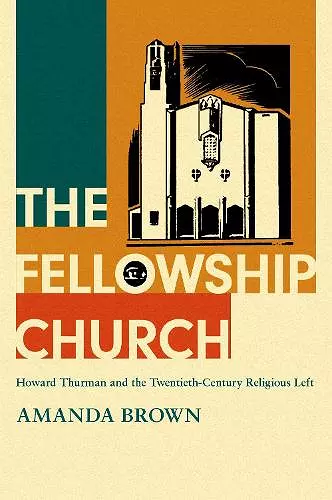The Fellowship Church
Howard Thurman and the Twentieth-Century Religious Left
Format:Hardback
Publisher:Oxford University Press Inc
Published:29th Sep '21
Currently unavailable, and unfortunately no date known when it will be back

The Fellowship Church explores the evolution of the American religious left through a case study of the African American intellectual and theologian Howard Thurman, and the physical embodiment of his thought: The Church for the Fellowship of All Peoples. The Fellowship Church, which Thurman co-founded in San Francisco in 1944, was the nation's first interracial, intercultural, and interfaith church. Amidst the growing nationalism of the World War II era and the heightened suspicion of racial and cultural "others," the Fellowship Church successfully established a pluralistic community based on the idea that "if people can come together in worship, over time would emerge a unity that would be stronger than socially imposed barriers." Rooted in the belief that social change was inextricably connected to internal, psychological transformation and the personal realization of the human community, it was an early expression of Christian nonviolent activism within the long Civil Rights Movement. The Fellowship Church was a product of evolving twentieth-century ideas and a reflection of the shifting mid-century American public consciousness. This book examines a broad scope of modern themes including the philosophy of pragmatism; mysticism and Christian liberalism; racism and imperialism; cosmopolitanism and pluralism; war and pacifism; and nonviolence. Not only does it expand on our understanding of twentieth-century American intellectual history and the origins of the Civil Rights Movement, it offers an exciting look into ways people have initiated grassroots activism during times when government has failed to protect its citizens' civil liberties, safety, and overall wellbeing through judicial safeguards.
Brown does an excelent job not just in fleshing out unique aspects of Thurman's thought but in contextualizing his appeal for segments of mid-twentieth-century black and white religious progressives. * Christopher Evans, The Journal of Religion *
A gem for classes and research on twentieth-century theology and church history, African American studies and American studies. * Scottish Journal of Theology *
Brown does an excellent job not just in fleshing out unique aspects of Thurman's thought but in contextualizing his appeal for segments ofmid--twentieth--century black and white religious progressives. * CHRISTOPHER EVANS, Boston University., The Journal of Religion *
the book is a gem for classes and research on twentieth-century theology and church history, African American studies and American studies. Brown's research is scrupulous in discussing major organisations that fostered aspects of Christian liberalism. And the national climate in race relations and war mobilisation are ever present for putting the significance of Fellowship Church and Thurman in context. Her thorough scholarship is chronicled in a compelling argument that is accessible and beautifully written. * Luther E. Smith Jr., Scottish Journal of Theology *
This is a well-researched, clearly written, personal and intellectual biography of intellectual, theologian, preacher, mystic, and civil rights leader Howard Thurman (1899-1981), whose is receiving renewed attention. * C. L. Kammer, CHOICE *
Brown has made an important contribution that will be of special interest to students and scholars of North American intellectual history, modern church history, and the intersection of spirituality and social change. * Edgar "Trey" Clark III, Religious Studies Review Vol 48.4 *
Amanda Brown makes an important contribution to both fields with The Fellowship Church. * Ian E. Van Dyke, Journal Of Ecclesiastical History *
ISBN: 9780197565131
Dimensions: 166mm x 241mm x 22mm
Weight: 522g
252 pages